If you’re in a dilemma between choosing Python and C#, you’re not alone. Many beginner developers wrestle with this decision.
Contents:
You’re eager to develop your first project, yet every forum you visit presents contrasting opinions. One minute you’re drawn to Python’s simplicity and readability, and the next, you’re captivated by C#’s power in building robust applications for Windows. Both languages boast useful features and unique advantages, but which one is the ideal path for you?
This article will unravel the strengths and weaknesses of these programming languages, helping you make an informed decision that aligns with your goals. We’ll explore everything from syntax and communities to practical applications and job prospects.
Before comparing Python vs C#, let’s start with definitions, pros and cons.
What is Python?
Python is a high-level, interpreted programming language emphasizing code readability and simplicity. Created by Guido van Rossum and released in 1991, it has since gained immense popularity among developers, data scientists, and researchers due to its versatility and ease of use.
It is particularly well-suited for beginners thanks to its user-friendly nature and extensive resources. Whether you’re interested in building web applications, analyzing data, or exploring machine learning, Python provides the tools you need to bring your ideas to life.
Advantages of Python
- Readable Syntax: Python’s design focuses on making the code easy to read and write. Its syntax is clean and straightforward, resembling plain English, which helps beginners grasp programming concepts faster.
- Interpreted Language: The code is executed line by line. This feature simplifies the debugging process and enables developers to test small sections of code interactively.
- Multi-Paradigm: It supports multiple programming paradigms, including procedural, object-oriented, and functional. This flexibility allows you to choose the best approach for your project.
- Extensive Libraries and Frameworks: Python programming language has a rich ecosystem of libraries and frameworks (such as NumPy, pandas, Flask, and Django) that streamline development for various applications, from web development and data analysis to artificial intelligence and machine learning.
- Cross-Platform Compatibility: It is platform-agnostic, meaning you can run Python programs on various operating systems, including Windows, macOS, and Linux, without the need for significant changes in the code.
- Strong Community Support: Python has a vast, active community of developers who contribute to its growth. This community produces comprehensive documentation, tutorials, forums, and open-source projects, making it easier for newcomers to learn and find solutions to problems.
- Widely Used: Python is employed across many industries, including web development, data science, machine learning, automation, scientific computing, and more. Its widespread usage means that proficiency in this language can open up many career opportunities.
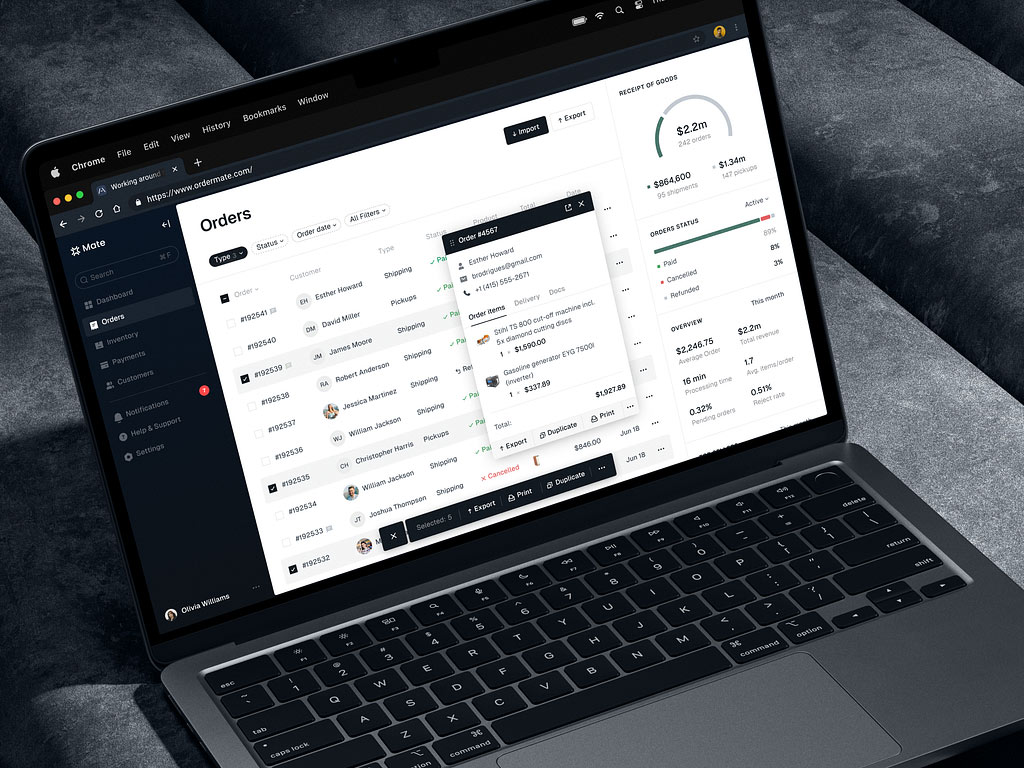
E-Commerce Admin Dashboard by Shakuro
Disavantages of Python
While Python programming language is powerful and versatile, it does have some cons:
- Performance: It is generally slower than compiled languages like C or C++ due to its interpreted nature. This can be a significant drawback for performance-critical applications, such as game engines or high-performance computing tasks.
- Memory Consumption: Python can have high memory usage compared to other languages, primarily due to its dynamic typing and object-oriented nature. This could be a concern for resource-constrained environments.
- Mobile Development: While it is great for server-side applications and scripting, it is not widely used for mobile app development, where languages like Java, Swift, or Kotlin are more common. There are frameworks (like Kivy) for mobile development in Python, but they are not as prevalent or optimized as other platforms.
- Weak in Mobile Computing: Python is not the best choice for mobile applications due to limited support for mobile technologies compared to languages that are specifically designed for mobile programming.
- Dynamic Typing Drawbacks: While dynamic typing allows for more flexible and quicker coding, it can also lead to runtime errors that might be caught earlier with statically typed languages. This could lead to issues in larger codebases.
- Limited Use in Game Development: You can create games in Python using libraries like Pygame, however, it is less performant than C++ or C#, which are commonly used with game engines such as Unity and Unreal Engine.
Use cases of Python
Why use Python? There are many ways you can leverage the advantages of this programming language. For example:
- Web Development: Python frameworks like Django and Flask are popular for building web applications, allowing developers to create robust and scalable websites quickly.
- Data Science and Analytics: It is a dominant language in data analysis, visualization, and machine learning, thanks to libraries like pandas, NumPy, Matplotlib, and scikit-learn.
- Machine Learning and Artificial Intelligence: Libraries such as TensorFlow, Keras, and PyTorch facilitate the development of machine learning models, making Python a go-to language in the AI field.
- Automation and Scripting: It is commonly used for scripting and automating repetitive tasks, such as file system management, data entry, and web scraping.
- Scientific Computing: The Python programming language is widely applied in scientific research and academic purposes due to libraries like SciPy and NumPy, which provide powerful tools for complex mathematical calculations.
- Internet of Things: You can leverage it in IoT projects for data collection, processing, and device control, often using microcontrollers like Raspberry Pi.
- DevOps and Infrastructure Management: Python scripting is frequently used to automate server management tasks and deploy cloud infrastructure in DevOps practices.
- Cybersecurity: You can implement this language in cybersecurity for writing scripts that automate tasks, analyze data, and conduct penetration testing.
- Desktop Applications: Libraries such as Tkinter and PyQt allow you to create desktop applications in Python.
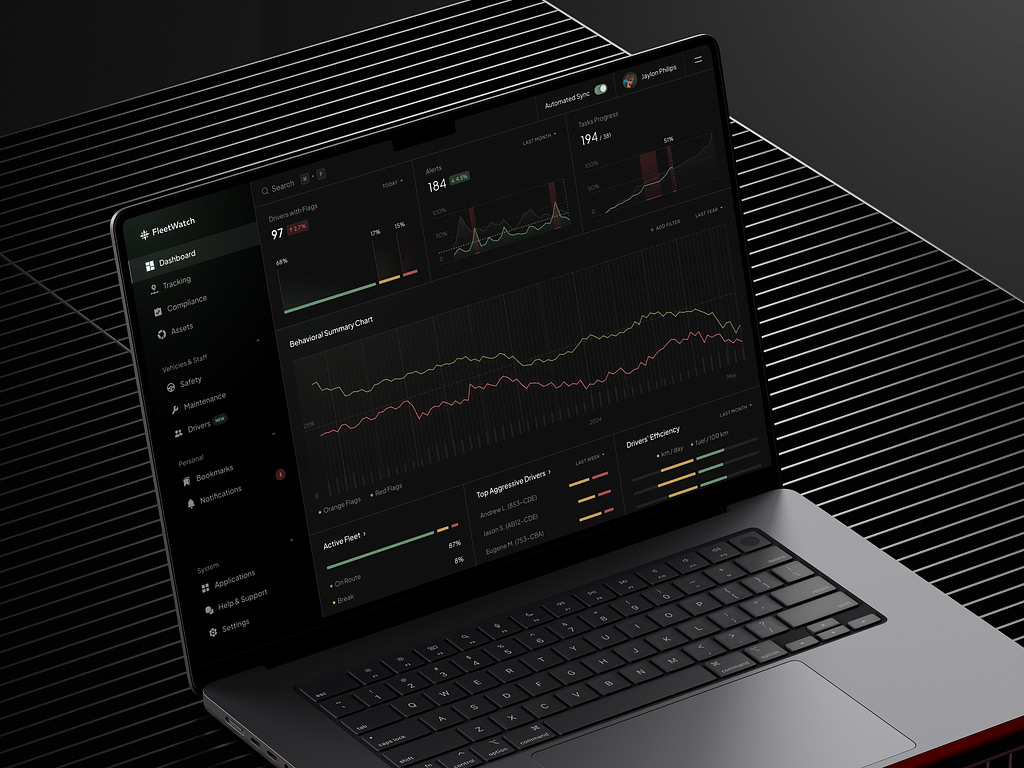
Telematics Company SaaS Dashboard by Shakuro
What is C#?
C# is a modern, object-oriented programming language developed by Microsoft as part of its .NET framework. It was designed to build various applications that run on the .NET platform, including desktop applications, web applications, mobile apps, and games.
Advantages of C#
- Object-Oriented: It emphasizes the concepts of objects, classes, inheritance, polymorphism, and encapsulation. This allows for better organization and modularity in code.
- Type-Safe: C# is a statically typed language, which means type checking is done at compile time. The feature reduces runtime errors and enhances code reliability.
- Multi-Paradigm: It also supports other programming paradigms, such as functional programming, making the language versatile for different approaches to problem-solving.
- Component-Oriented: C# supports the development of reusable software components, so you can create and use libraries of components for faster application development.
- Cross-Platform: With the introduction of .NET Core (now part of .NET 5 and later), C# has become a cross-platform language, allowing you to build applications that run on Windows, macOS, and Linux.
- Rich Libraries and Frameworks: C# is supported by a vast range of libraries and frameworks, including ASP.NET for web development, Xamarin for mobile applications, and Unity for game development.
- Integrated Development Environment: The programming language is often used with Microsoft Visual Studio, a powerful IDE that provides an extensive set of tools for coding, debugging, and testing.
- Garbage Collection: C# includes automatic garbage collection, which simplifies memory management by automatically reclaiming unused memory, helping prevent memory leaks.
Disadvantages of C#
Just like Python programming language, C# also comes with some disadvantages:
- Windows-Centric: Historically, C# and the .NET framework have been closely tied to the Windows operating system, which can limit its appeal for developers targeting other platforms. However, this has improved with .NET Core and .NET 5, which support cross-platform development.
- Performance Overhead: Compared to languages like C or C++, C# may have additional overhead due to its runtime environment and garbage collection. This can impact performance in high-performance applications, such as game engines or real-time systems.
- Learning Curve: Although C# is generally considered beginner-friendly, the breadth of its features and the .NET ecosystem may present a steep learning curve for new developers, especially if they need to understand its advanced concepts.
- Dependency on the Framework: C# relies heavily on the .NET framework and its libraries. If a particular library or framework does not meet project requirements, you need to put significant effort into finding alternatives or building custom solutions.
- Less Control Over Memory Management: While garbage collection simplifies memory management, it can also lead to unpredictability in resource management. You have less control over when memory is allocated and deallocated, which can be a drawback for performance-sensitive applications.
- Community and Ecosystem Size: In terms of Python vs C# comparison, the latter has a smaller community. This can sometimes lead to fewer third-party libraries or frameworks in certain niches.
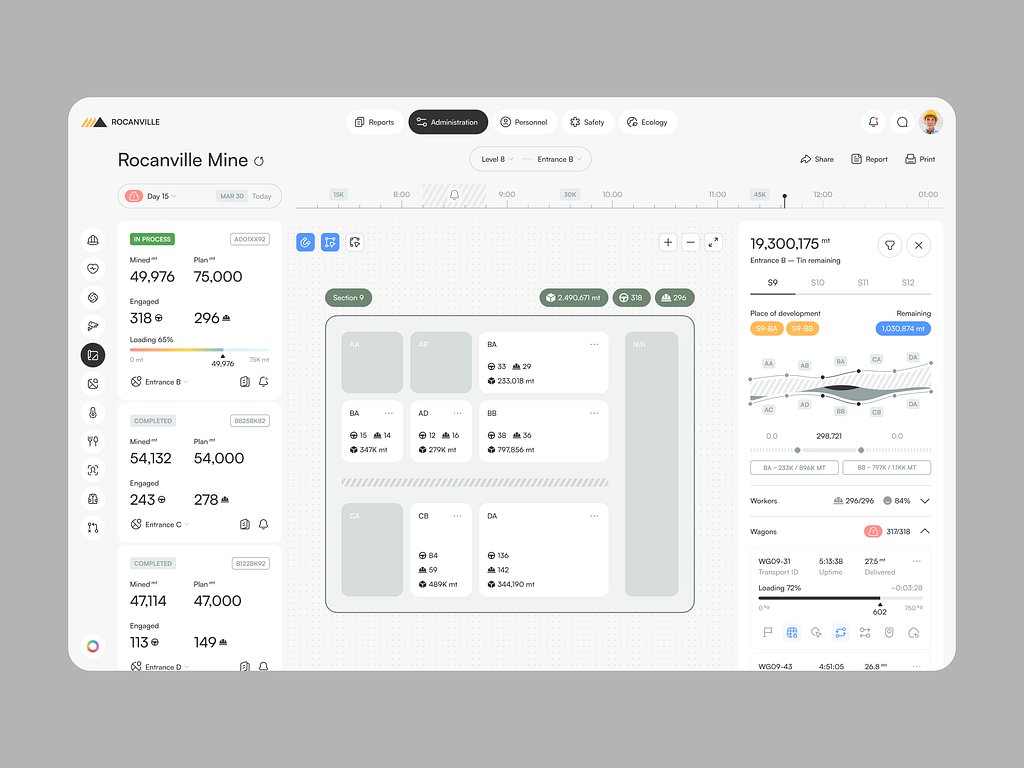
Mining Dashboard Design Concept by Shakuro
Use cases of C#
Why use C#? The main reason you can easily harness its advantages in the following spheres:
- Web Development: Utilizing ASP.NET, you can build robust, scalable web applications and APIs.
- Game Development: With game engines like Unity, your team can create both 2D and 3D games across multiple platforms.
- Mobile Applications: Develop mobile applications for iOS and Android using shared codebases and Xamarin.
- Desktop Applications: Build Windows desktop applications using Windows Forms, WPF (Windows Presentation Foundation), or UWP (Universal Windows Platform).
- Cloud-Based Solutions: You can create applications and services that run on Microsoft Azure, benefiting from cloud capabilities like scalability and reliability.
- Enterprise Applications: It is possible to build complex and large-scale applications for enterprises, focusing on business logic, data management, and scalable architectures.
- Internet of Things: Develop IoT applications that can run on various devices and communicate with cloud services.
- Machine Learning: With ML.NET, you can create machine learning models integrated into .NET applications for tasks like predictive analytics.
Python vs C# – A side-by-side comparison
Time for a showdown. Let’s dive into the difference between Python and C#, starting with a short table.
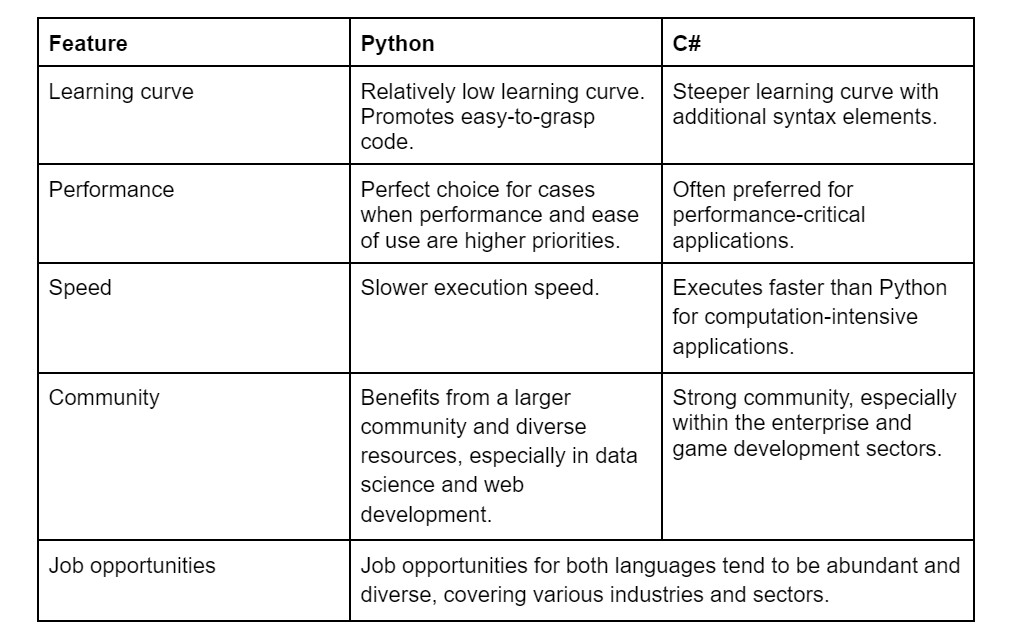
Learning сurve
Python generally has a gentler learning curve than C#. Its readability, simplicity, and supportive community make it an excellent choice for beginners. The language promotes writing code that is more understandable, which helps new programmers grasp concepts quickly. At the same time, the development environment is flexible, allowing you to write code in simple text editors or integrated development environments (IDEs). With tools like Jupyter Notebooks, you can visualize data and results interactively.
C# has a more complex structure and features that pose a challenge for those new to programming. Additional syntax elements, such as type declarations and access modifiers, can complement the learning curve. There are also advanced programming concepts like LINQ, asynchronous programming, and object-oriented design principles.
The primary IDE for C# development is Visual Studio, which is feature-rich and powerful but can be overwhelming. So setting up and navigating IDEs for C# might have a steeper learning curve initially.
However, both languages offer valuable opportunities and can be mastered with dedication and practice.
Performance and speed
When comparing C# vs Python, speed is a must-have quality. The first one is compiled into an Intermediate Language (IL) and then executed by the Common Language Runtime (CLR) in the .NET framework. Due to this compilation process, C# typically executes faster than Python for computation-intensive applications. It also has optimizations at compile-time, which can lead to better performance in scenarios requiring complex calculations or processing large datasets.
What’s more, C# often has better memory management features. It provides options like garbage collection and static typing, which lead to more efficient memory usage. There is strong support for multithreading and parallel processing, with features like the Task Parallel Library (TPL) and async/await patterns. This allows you to build highly concurrent apps taking advantage of multi-core processors.
If we compare C# vs Python, performance will vary. The latter is an interpreted language, so the code is executed line-by-line during runtime. This interpretation step generally results in a slower execution speed. For tasks like numerical computations, Python can be significantly slower.
Still, Python made yet another step toward acceleration. Instead of complete AOT (ahead of time) compilation prior to execution, the most recent version 3.13 employs JIT (just in time) compilation. The strategy speeds up work by 2-9% since Python will only run what has been compiled. Furthermore, it has fewer optimization choices than compiled languages. While libraries such as Cython and PyPy help speed up the process, they may not be as successful as native compilation.
Python is known for its simple and flexible data types, but this flexibility can come with a higher memory overhead. The dynamic typing system can lead to increased memory consumption, especially in large applications or when managing extensive data structures.
Drawing the line in C# vs Python speed comparison, C# is often preferred for performance-critical applications like game development (using Unity), enterprise apps, or any situation that benefits from the .NET ecosystem. Python is perfect for scripting, data analysis, web development, and machine learning, where development speed and ease of use are higher priorities than raw execution speed.
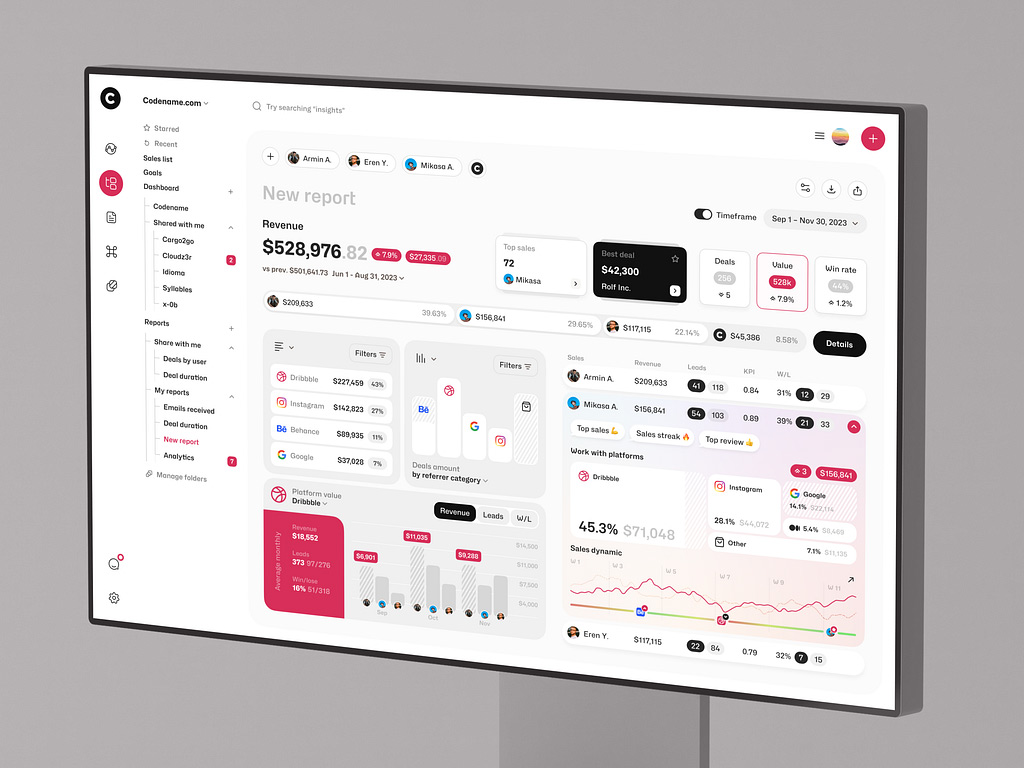
Sales Analytics Dashboard by Shakuro
Community and resources
C# has a strong community, especially within the enterprise and game development sectors. The Microsoft backing provides a robust foundation and offers extensive documentation, including tutorials, API references, and best practice guides. There is a wide range of frameworks, the most notable being the .NET framework, which supports various application types such as web, mobile, and desktop development.
Python boasts one of the largest programming communities. Its growth in popularity is credited to its use in data science, web development, automation, and artificial intelligence. It features comprehensive documentation, including a well-maintained official site with tutorials, guides, and references. Moreover, the programming language has a rich ecosystem of libraries and frameworks, particularly for data science (e.g., Pandas, NumPy, TensorFlow), web development (e.g., Django, Flask), and automation (e.g., Selenium).
Both C# and Python have vibrant communities. Python benefits from a larger community and diverse resources, especially in the data science and web development spaces. C# has a strong, dedicated user base with excellent support from Microsoft, particularly in enterprise and game development.
Career opportunities
According to StackOverflow, around 51% of developers opt for Python, while 27% choose C#. The median yearly salary for Python developers is around $67 559, and for C# specialists – $65 469. These numbers are for devs with a professional experience of 9 or more years.
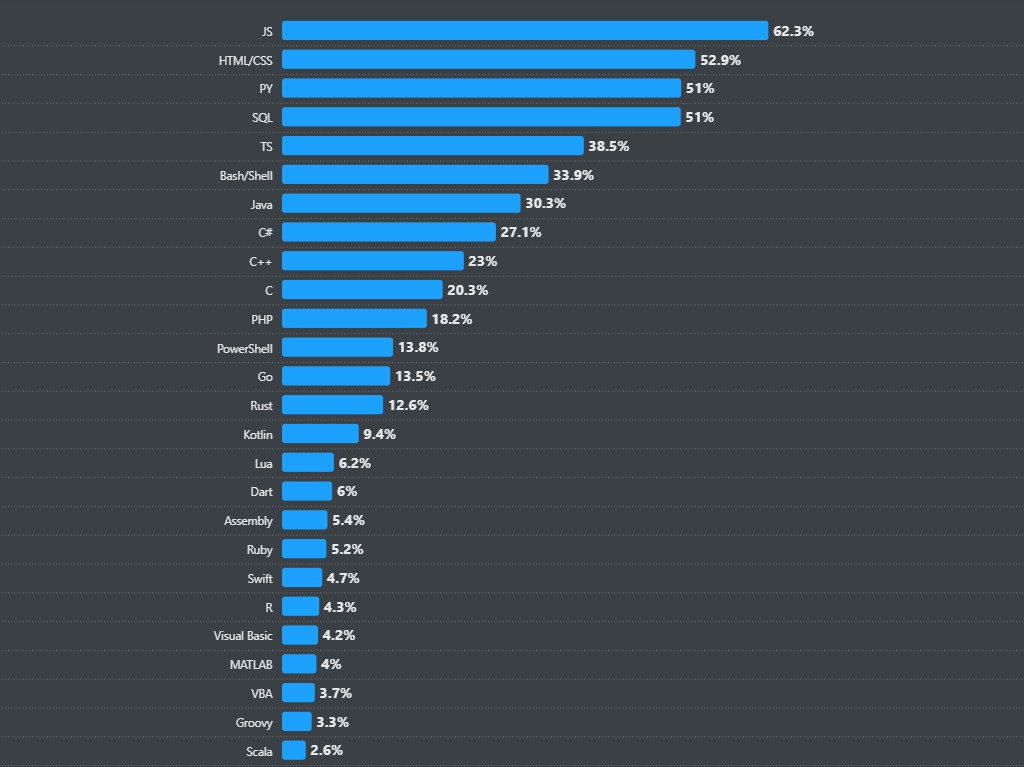
C# is commonly used in enterprise environments, game development, and applications where performance is key. The job market reflects a steady demand for skilled C# developers. As for Python, its popularity in data science, machine learning, and web development leads to a very high demand for skilled developers. The job opportunities for both languages tend to be abundant and diverse, covering various industries and sectors.
How to Choose Between Python and C#
The choice depends on several factors, including the specific project requirements, personal preferences, and the domains you intend to work within. Here are some considerations to guide your decision:
- Purpose of the Project: Start with determining the type of application you want to build. Some languages are better suited for specific tasks (e.g., web development, data analysis, game development).
- Performance Requirements: Assess the performance needed for your project. C# may provide better performance for resource-intensive applications, whereas Python might be sufficient for simpler tasks.
- Learning Curve: Consider your current skill level. If you’re a beginner, a language with a gentler learning curve like Python is preferable.
- Ecosystem and Libraries: Investigate the libraries and frameworks available for each language. A rich ecosystem can significantly reduce development time and increase productivity.
- Community Support: Check the community support, resources, and documentation. A thriving community can provide valuable help and resources when you encounter challenges.
- Job Market and Demand: Look at job opportunities in your area or your desired field. Some languages have a higher demand than others.
- Integration and Compatibility: Consider how well each language integrates with existing systems or technologies that your project may need to interact with.
- Long-Term Viability: Evaluate the long-term outlook for each language. Opting for a language that is growing in popularity is beneficial for future-proofing your skills and projects.
- Personal Preference: Finally, factor in your preferences and interests. Sometimes, passion for a specific language or its community can make a significant difference in motivation and productivity.
Conclusion
While Python and C# both serve as powerful tools in the developer’s toolkit, they cater to different needs and preferences. Python is celebrated for its simplicity and readability, making it an excellent choice for beginners and rapid prototyping, especially in fields like data science and machine learning. On the other hand, C# shines in application development within the Microsoft ecosystem, particularly for creating robust web and desktop applications with strong performance and type safety.
When considering your journey as a beginner developer, it’s essential to reflect on your goals: if you aim for versatility and ease of learning, Python is the way to go. Conversely, if you’re drawn to software development in a structured environment with clear guidelines, C# may be the better fit.
Do you need a development team experienced in both C# and Python? Contact us and let’s work together on your next project.
